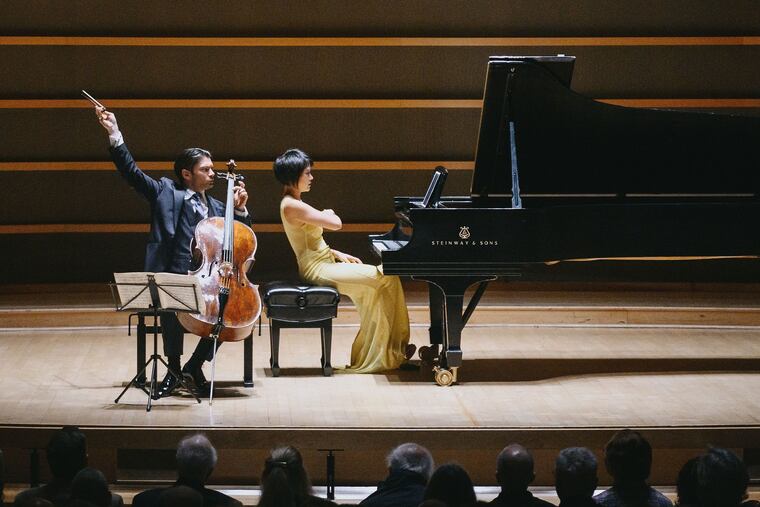Pianist Yuja Wang and cellist Gautier Capucon take their PCMS audience on a superstar thrill ride
Fast runs? Check. Extreme registers? Check. Their two-titan recital at the Kimmel Center was a singular thrill.

Here’s a problem most of us will never have: Your piano accompanist is a towering talent you must find repertoire as challenging for her as it is for you.
The solution Monday night came in the form of Chopin in an unusual recital by cellist Gautier Capuçon and pianist Yuja Wang.
Fast runs? Extreme registers? Two Chopin works put these musicians on a level playing field in their Philadelphia Chamber Music Society appearance in the Perelman Theater. I don’t actually know what the power equation was in arriving at the repertoire, but as battles of the titans go, the resulting recital was a rare thrill.
There is plenty of standard repertoire for cello and piano, of course, and the pair managed to avoid all of it. Well, one encore, “The Swan” from Saint-Saëns’ The Carnival of the Animals, qualified. The second encore, Piazzolla’s Le Grand Tango, was an extravagance of passion that made the audience erupt.
Franck’s lovingly meandering Sonata for Violin and Piano in A Major was adapted for cello and piano, and for the most part made the journey justifying itself in turns atmospheric and tuneful. The music still seemed idiomatic as transcribed for cello, and particularly so at the start of the pensive “Recitativo-Fantasia: Ben moderato” movement. Capuçon has a gorgeously complex sound in the low, quiet parts of his voice. He is refined and so smoothly nimble you never sense a drop of struggle. Expressively, though, his approach to the Franck was cool.
Intentional contrast to the rest of the program? The term accompanist has never done a very good job of describing the relationship between pianist and instrumentalist (or singer, for that matter) in any piece. But as essentially a keyboard composer, Chopin brought absolute egalitarianism to the party, and a party it was.
There wasn’t tremendous emotional range to the evening. But Wang — a star locally since her Curtis days and a superstar everywhere else since — is a pianist worth hearing because of her strong personality, and it was there in abundance. In the Chopin Cello Sonata, Opus 65, she found ideas and musical lines to underscore in boldface. So excitable was the last movement you felt you were in the throes of some weather phenomenon. She digs into moments of arrival, releasing a deep sense of satisfaction.
Chopin’s Introduction and Polonaise Brilliante in C Major, Opus 3, favored flash over substance, an equation this recital tested throughout. The piece has players moving up and down their instruments in a variety of dramatic and technically elaborate gestures. It was pure adrenaline, and even if it veered into the realm of fluff, there was no denying that here was a mode of expression that fell as convincingly on pianist as cellist.